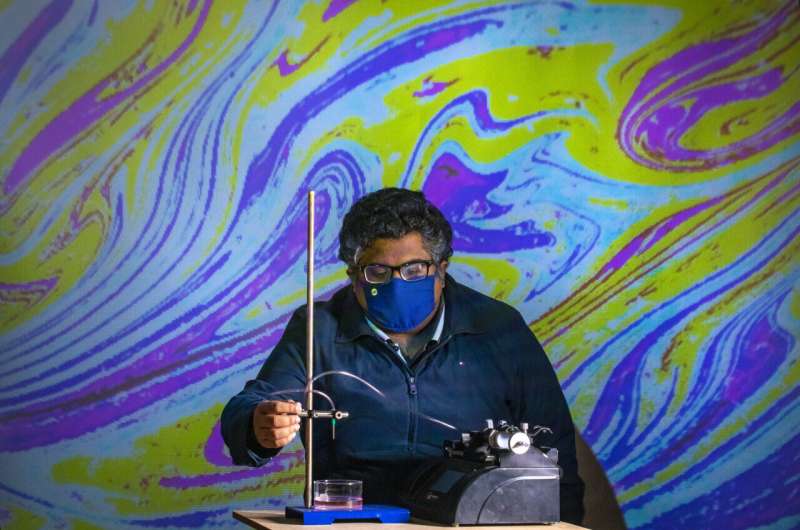#Researchers looking at oil and water interaction to prevent water contamination

“#Researchers looking at oil and water interaction to prevent water contamination”

Oil spills in the ocean have a devastating impact on the environment. More than 400,000 gallons of oil are spilled in oceans each year, affecting hundreds of square miles and killing more than 50,000 aquatic animals. In 2019 alone, five oil spills—three classified as major to medium—devastated ecosystems.
Prior research has investigated the ways in which oil slicks spread, but scientists and engineers understand less about what happens when a jet of oil spews out at very high pressure and collides with the water. Knowing what an oil drop does when it initially hits water is will be key to making oil-spill cleanups more efficient, and this is the subject of new research being conducted by Assistant Professor Anand Sushant and Varun Kulkarni, a post-doc researcher.
Their work shows that oil droplets from a high-pressure jet—such as the spray gushing from a damaged boat—traveled great distances and displayed different behaviors from an oil slick. Depending on certain properties, Anand and Kulkarni found, a droplet from a jet will oscillate for a period of time and then spread out.
“We want to understand what happens during the initial contact when an oil drop touches the ocean surface,” Anand said. “After some time, it forms a film. How did this transition happen? What controls the growth of this spread? That’s what we are trying to understand.”
The researchers tested 11 different crude oils and observed how each one spreads. Their findings demonstrate that properties of the oil such as viscosity and surface tension affect how the contaminants spread on the surface.
“When the oil is less viscous—like water—it skips across the water and leaves oil stains in each spot it hits,” Kulkarni said. “The thicker, or more viscous, the oil, the slower it will disperse.”
The next step in their research is to test a mixture of oils to see what happens. They also will experiment with the addition of nano-sized particles to oil, which could alter the behavior completely, Kulkarni said.
By improving the understanding of the initial steps of how oil spreads from a high-pressure jet, the research has the potential to improve cleanup strategies, reduce the damage caused by oil spills, and prevent oil contamination.
“The research that we do in the lab, in my mind, should be a service to humanity,” Anand said. “There should be a purpose behind the research, and the purpose here impacts people and our society across the whole world.”
Additional investigators working on the research include Yashasvi Venkata Lolla, now at Virginia Polytechnic Institute and State University; Suhas Tamvada, now at the University of Florida; and Nikhil Shirdade at UIC. The funding for the research was made possible by a National Science Foundation EAGER award to study dewetting dynamics at liquid/air interfaces.
A paper about the research is available in the Journal of Colloid and Interface Science under the title “Coalescence and spreading of drops on liquid pools.”
Chemical herders could impact oil spill cleanup
Varun Kulkarni et al, Coalescence and spreading of drops on liquid pools, Journal of Colloid and Interface Science (2020). DOI: 10.1016/j.jcis.2020.10.089
Find more information about this research and Anand’s other investigations on the Anand Laboratory website.
Citation:
Researchers looking at oil and water interaction to prevent water contamination (2021, June 30)
retrieved 1 July 2021
from https://phys.org/news/2021-06-oil-interaction-contamination.html
This document is subject to copyright. Apart from any fair dealing for the purpose of private study or research, no
part may be reproduced without the written permission. The content is provided for information purposes only.
If you liked the article, do not forget to share it with your friends. Follow us on Google News too, click on the star and choose us from your favorites.
For forums sites go to Forum.BuradaBiliyorum.Com
If you want to read more Like this articles, you can visit our Science category.




